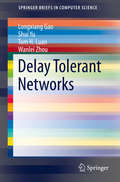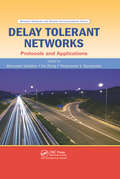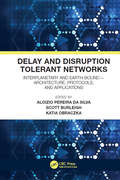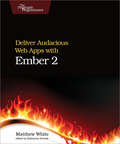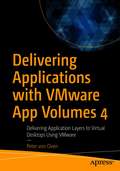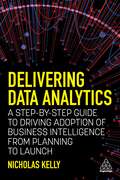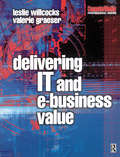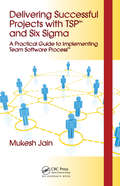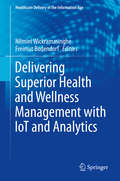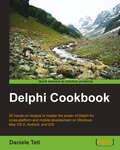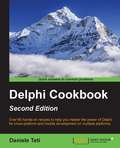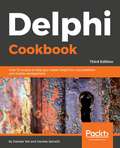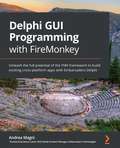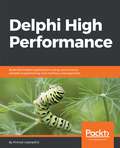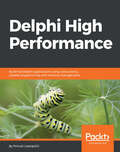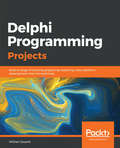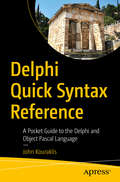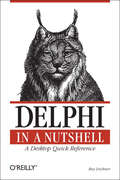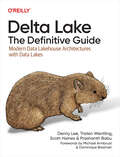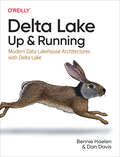- Table View
- List View
Delay Tolerant Networks
by Shui Yu Longxiang Gao Tom H. Luan Wanlei ZhouThis brief presents emerging and promising communication methods for network reliability via delay tolerant networks (DTNs). Different from traditional networks, DTNs possess unique features, such as long latency and unstable network topology. As a result, DTNs can be widely applied to critical applications, such as space communications, disaster rescue, and battlefield communications. The brief provides a complete investigation of DTNs and their current applications, from an overview to the latest development in the area. The core issue of data forward in DTNs is tackled, including the importance of social characteristics, which is an essential feature if the mobile devices are used for human communication. Security and privacy issues in DTNs are discussed, and future work is also discussed.
Delay Tolerant Networks: Protocols and Applications
by Athanasios V. Vasilakos Yan Zhang Thrasyvoulos SpyropoulosA class of Delay Tolerant Networks (DTN), which may violate one or more of the assumptions regarding the overall performance characteristics of the underlying links in order to achieve smooth operation, is rapidly growing in importance but may not be well served by the current end-to-end TCP/IP model. Delay Tolerant Networks: Protocols and Applicat
Delay and Disruption Tolerant Networks: Interplanetary and Earth-Bound -- Architecture, Protocols, and Applications
by Aloizio Pereira da Silva, Scott Burleigh and Katia ObraczkaDelay- and Disruption Tolerant Networks (DTNs) are networks subject to arbitrarily long-lived disruptions in connectivity and therefore cannot guarantee end-to-end connectivity at all times. Consequently DTNs called for novel core networking protocols since most existing Internet protocols rely on the network’s ability to maintain end-to-end communication between participating nodes. This book presents the fundamental principles that underline DTNs. It explains the state-of-the-art on DTNs, their architecture, protocols, and applications. It also explores DTN’s future technological trends and applications. Its main goal is to serve as a reference for researchers and practitioners.
Delete
by Viktor Mayer-SchönbergerDelete looks at the surprising phenomenon of perfect remembering in the digital age, and reveals why we must reintroduce our capacity to forget. Digital technology empowers us as never before, yet it has unforeseen consequences as well. Potentially humiliating content on Facebook is enshrined in cyberspace for future employers to see. Google remembers everything we've searched for and when. The digital realm remembers what is sometimes better forgotten, and this has profound implications for us all. In Delete, Viktor Mayer-Schönberger traces the important role that forgetting has played throughout human history, from the ability to make sound decisions unencumbered by the past to the possibility of second chances. The written word made it possible for humans to remember across generations and time, yet now digital technology and global networks are overriding our natural ability to forget--the past is ever present, ready to be called up at the click of a mouse. Mayer-Schönberger examines the technology that's facilitating the end of forgetting--digitization, cheap storage and easy retrieval, global access, and increasingly powerful software--and describes the dangers of everlasting digital memory, whether it's outdated information taken out of context or compromising photos the Web won't let us forget. He explains why information privacy rights and other fixes can't help us, and proposes an ingeniously simple solution--expiration dates on information--that may. Delete is an eye-opening book that will help us remember how to forget in the digital age.
Delete: The Virtue of Forgetting in the Digital Age
by Viktor Mayer-SchönbergerThe hazards of perfect memory in the digital ageDelete looks at the surprising phenomenon of perfect remembering in the digital age, and reveals why we must reintroduce our capacity to forget. Digital technology empowers us as never before, yet it has unforeseen consequences as well. Potentially humiliating content on Facebook is enshrined in cyberspace for future employers to see. Google remembers everything we've searched for and when. The digital realm remembers what is sometimes better forgotten, and this has profound implications for us all.In Delete, Viktor Mayer-Schönberger traces the important role that forgetting has played throughout human history, from the ability to make sound decisions unencumbered by the past to the possibility of second chances. The written word made it possible for humans to remember across generations and time, yet now digital technology and global networks are overriding our natural ability to forget—the past is ever present, ready to be called up at the click of a mouse. Mayer-Schönberger examines the technology that's facilitating the end of forgetting—digitization, cheap storage and easy retrieval, global access, and increasingly powerful software—and describes the dangers of everlasting digital memory, whether it's outdated information taken out of context or compromising photos the Web won't let us forget. He explains why information privacy rights and other fixes can't help us, and proposes an ingeniously simple solution—expiration dates on information—that may.Delete is an eye-opening book that will help us remember how to forget in the digital age.
Deliver Audacious Web Apps with Ember 2
by Matthew WhiteIt's time for web development to be fun again, time to write engaging and attractive apps--fast--in this brisk tutorial. Build a complete user interface in a few lines of code, create reusable web components, access RESTful services and cache the results for performance, and use JavaScript modules to bring abstraction to your code. Find out how you can get your crucial app infrastructure up and running quickly, so you can spend your time on the stuff great apps are made of: features.With its 2.0 release, the Ember JavaScript framework has taken a major step forward. In this book, you'll learn these new features: how to use module-driven development with Ember CLI, take advantage of the new DOM-based rendering engine, and use a service-based architecture to make your apps flexible, not brittle.Use the Ember CLI to build your app using module-focused JavaScript classes with a clear project structure. Learn how to use Ember's routing classes to organize your app, write web components that marry your user interface and logic without leaky access to state, and read and write data from RESTful services with almost no code. Make use of services to encapsulate logic and inject it throughout your app, and use Ember CLI to rapidly iterate changes, deploy locally, test your code, and build for production. You'll learn all the essentials of working with Ember.If you're tired of feeling limited by your web development tools, unleash your ambition and start creating ambitious web applications with Ember.What You Need:You need Ember, Ember CLI, Google Chrome or Mozilla Firefox, and a text editor.
Delivering Applications with VMware App Volumes 4: Delivering Application Layers to Virtual Desktops Using VMware
by Peter von OvenAcquire the skills to build an App Volumes environment for a proof of concept, a pilot, or a live production environment. Delivering Applications with VMware App Volumes 4 starts with an in-depth overview of where the solution fits within the market and its key features, introducing you to application layering and VMware App Volumes. Next, it explains how to install the software and use its management consoles to configure App Volumes. You will understand how to build and configure application layers for delivery and will learn to build and configure writeable volumes for user data and user-installed applications. In the advanced management section, you will learn to customize package templates and integrate App Volumes with JMP. Along the way you will understand how to deliver published apps in MS RemoteApp using layered apps for scalability. In the next phase of the book you will install and configure App Volumes for different use cases: VMware Horizon View, VMware ThinApp, Microsoft RDSH, and Citrix Virtual Apps and Desktops. Throughout the chapters, you will be given hints and tips, along with best practices, all seen from the eyes of somebody who works with this technology day in, day out, and in many different types of environments and scenarios. What You Will Learn Understand the App Volumes architecture Master the concept of application layeringWork with App Volumes, application packages, and Writable Volumes Who This Book Is For VMware professionals, system integrators, IT professionals, and consultants.
Delivering Data Analytics: A Step-By-Step Guide to Driving Adoption of Business Intelligence from Planning to Launch
by Nicholas KellyThe importance of data analytics is well known, but how can you get end users to engage with analytics and business intelligence (BI) when adoption of new technology can be frustratingly slow or may not happen at all? Avoid wasting time on dashboards and reports that no one uses with this practical guide to increasing analytics adoption by focusing on people and process, not technology. Pulling together agile, UX and change management principles, Delivering Data Analytics outlines a step-by-step, technology agnostic process designed to shift the organizational data culture and gain buy-in from users and stakeholders at every stage of the project. This book outlines how to succeed and build trust with stakeholders amid the politics, ambiguity and lack of engagement in business. With case studies, templates, checklists and scripts based on the author's considerable experience in analytics and data visualisation, this book covers the full cycle from requirements gathering and data assessment to training and launch. Ensure lasting adoption, trust and, most importantly, actionable business value with this roadmap to creating user-centric analytics projects.
Delivering IT and eBusiness Value
by Leslie Willcocks Valerie Graeser'Delivering Business Value from IT' is focused on the evaluation issue in IT and how IT evaluation can proceed across the life-cycle of any IT investment and be linked positively to improving business performance. Chapters 1,2 and 3 detail an approach to IT evaluation whilst chapters 4 and 5 build on these by showing two distinctive approaches to linking IT to business performance. The remaining three chapters deal with a range of evaluation issues emerging as important - specifically Internet evaluation, Y2K and beyond, EMU, quality outsourcing, infrastructure, role of benchmarking, and cost of ownership issues that practitioners regularly encounter.
Delivering Police Services Effectively (Advances in Police Theory and Practice #27)
by Garth den HeyerThis book addresses the various strategies that are available to police management, such as consolidation, regionalization, and amalgamation of police agencies; new public management (NPM); enhanced performance management; civilianization; and organizational restructuring. It fills the gap in the research as to how police agencies have reacted to the environmental and fiscal changes since the 1980s. The book examines the strategies employed and the effect on police and their delivery of service.
Delivering Successful Projects with TSP(SM) and Six Sigma: A Practical Guide to Implementing Team Software Process(SM)
by Mukesh JainDelivering successful projects means the ability to produce high quality software within budget and on time-consistently, but when one mentions quality to software engineers or project managers, they talk about how impossible it is to eliminate defects from software. This assumption is passed on and on until it becomes accepted wisdom, with the power of a self-fulfilling prophecy. And when a project fails to arrive on time or up to standards, team members will turn on each other. The project got delayed because the engineers did a poor job in development or too much was promised upfront for this short of a timeline.In Delivering Successful Projects with TSPSM and Six Sigma: A Practical Guide to Implementing Team Software ProcessSM, you will learn how to effectively manage the development of a software project and deliver it in line with customer expectations. This refreshing volume -Offers real-world case studies about the author's experience at Microsoft successfully implementing TSP to achieve higher quality softwareEmpowers software developers to take responsibility for project managementExplains how Six Sigma and TSP combined can dramatically reduce software defectsBy applying these principles put forth by one of the most respected names in software development, your software team will learn how to function as a team and turn out products where zero defects and on-time delivery are the norm.
Delivering Superior Health and Wellness Management with IoT and Analytics (Healthcare Delivery in the Information Age)
by Nilmini Wickramasinghe Freimut BodendorfThis in-depth book addresses a key void in the literature surrounding the Internet of Things (IoT) and health. By systematically evaluating the benefits of mobile, wireless, and sensor-based IoT technologies when used in health and wellness contexts, the book sheds light on the next frontier for healthcare delivery. These technologies generate data with significant potential to enable superior care delivery, self-empowerment, and wellness management. Collecting valuable insights and recommendations in one accessible volume, chapter authors identify key areas in health and wellness where IoT can be used, highlighting the benefits, barriers, and facilitators of these technologies as well as suggesting areas for improvement in current policy and regulations.Four overarching themes provide a suitable setting to examine the critical insights presented in the 31 chapters:Mobile- and sensor-based solutionsOpportunities to incorporate critical aspects of analytics to provide superior insights and thus support better decision-makingCritical issues around aspects of IoT in healthcare contextsApplications of portals in healthcare contextsA comprehensive overview that introduces the critical issues regarding the role of IoT technologies for health, Delivering Superior Health and Wellness Management with IoT and Analytics paves the way for scholars, practitioners, students, and other stakeholders to understand how to substantially improve health and wellness management on a global scale.
Delphi Cookbook
by Daniele TetiIntended to refresh the basics of Delphi as well as advance your knowledge to the next level, it is assumed you will know RAD studio and the Object Pascal language. However, if you are not an experienced RAD studio programmer this accessible guide will still develop those initial crucial skills.
Delphi Cookbook - Second Edition
by Daniele TetiOver 60 hands-on recipes to help you master the power of Delphi for cross-platform and mobile development on multiple platforms About This Book * Get to grips with Delphi to build and deploy various cross-platform applications * Design, develop, and deploy real-world applications by implementing a single source codebase * This swift guide will increase your productivity to develop applications with Delphi Who This Book Is For If you are an intermediate developer with a basic knowledge of Delphi and you want to develop cross-platform applications, then this book is for you. Familiarity with the fundamentals of RAD (Rapid Application Development) Studio is expected. What You Will Learn * Develop visually stunning applications using FireMonkey * Deploy LiveBinding effectively with the right OOP approach * Create server-side programs to serve RESTful web services and provide data to your mobile apps * Use well-defined GUI design patterns to build mobile applications that provide a great user experience * Build mobile apps that read data from a remote server efficiently * Call the platform native API on Android and iOS even for an unpublished API * Manage software customization for your customer by making better use of an extended RTTI * Implement the most popular design pattern without wasting too much time on debugging and bug fixing In Detail Delphi is a cross-platform Integrated Development Environment (IDE) that supports rapid application development for Microsoft Windows, Apple Mac OS X, Google Android, and Apple iOS. It helps you to concentrate on the real business and save yourself the pain of wandering amid GUI widget details, or having to tackle inter-platform incompatibilities. It also has a wide range of drag-and-drop controls, helping you code your business logic into your business model, and it compiles natively for desktop and mobile platforms. This book will teach you how to design and develop applications, deploy them on the cloud platform, and distribute them within an organization via Google Play and other similar platforms. You will begin with the basics of Delphi and get acquainted with JSON format strings, XSLT transformations, unicode encodings and various types of streams. We then move on to more advanced topics such as developing higher-order functions and using enumerators and RTTI. You will get an understanding of how Delphi RTL functions and how to use FireMonkey in a VCL application. We will then cover topics such as multithreading, using the parallel programming library and putting Delphi on a server. We will also take a look at the new feature of WebBroker Apache modules and then ride the mobile revolution with FireMonkey. By the end of the book, you will be able to develop and deploy cross-platform applications using Delphi. Style and approach Delphi Cookbook is an easy-to-follow guide, rich with hands-on examples of real-world programming tasks in Delphi.
Delphi Cookbook,: Recipes to master Delphi for IoT integrations, cross-platform, mobile and server-side development, 3rd Edition
by Daniele Teti Daniele SpinettiQuickly learn and employ practical recipes for developing real-world, cross-platform applications using Delphi.Key FeaturesGet to grips with Delphi to build and deploy various cross-platform applicationsDesign and deploy real-world apps by implementing a single source codebaseBuild robust and optimized GUI applications with easeBook DescriptionDelphi is a cross-platform integrated development environment (IDE) that supports rapid application development on different platforms, saving you the pain of wandering amid GUI widget details or having to tackle inter-platform incompatibilities. Delphi Cookbook begins with the basics of Delphi and gets you acquainted with JSON format strings, XSLT transformations, Unicode encodings, and various types of streams. You’ll then move on to more advanced topics such as developing higher-order functions and using enumerators and run-time type information (RTTI). As you make your way through the chapters, you’ll understand Delphi RTL functions, use FireMonkey in a VCL application, and cover topics such as multithreading, using aparallel programming library and deploying Delphi on a server. You’ll take a look at the new feature of WebBroker Apache modules, join the mobile revolution with FireMonkey, and learn to build data-driven mobile user interfaces using the FireDAC database access framework. This book will also show you how to integrate your apps with Internet of Things (IoT).By the end of the book, you will have become proficient in Delphi by exploring its different aspects such as building cross-platforms and mobile applications, designing server-side programs, and integrating these programs with IoT.What you will learn Develop visually stunning applications using FireMonkeyDeploy LiveBinding effectively with the right object-oriented programming (OOP) approachCreate RESTful web services that run on Linux or Windows Build mobile apps that read data from a remote server efficientlyCall platform native API on Android and iOS for an unpublished API Manage software customization by making better use of an extended RTTIIntegrate your application with IOTWho this book is forDelphi Cookbook is for intermediate developers with a basic knowledge of Delphi who want to discover and understand all the development possibilities offered by it.
Delphi GUI Programming with FireMonkey: Unleash the full potential of the FMX framework to build exciting cross-platform apps with Embarcadero Delphi
by Andrea Magni Marco CantuCreate modern yet effective multi-platform applications by building interactive UIs following a single codebase approach to boost productivityKey FeaturesDelve into the FireMonkey framework and explore its powerful capabilitiesEnhance the user experience by using various technologies included in Delphi and FMXBoost developer productivity through the cross-platform capabilities enabled by the frameworkBook DescriptionFireMonkey (FMX) is a cross-platform application framework that allows developers to create exciting user interfaces and deliver applications on multiple operating systems (OS). This book will help you learn visual programming with Delphi and FMX.Starting with an overview of the FMX framework, including a general discussion of the underlying philosophy and approach, you'll then move on to the fundamentals and architectural details of FMX. You'll also cover a significant comparison between Delphi and the Visual Component Library (VCL). Next, you'll focus on the main FMX components, data access/data binding, and style concepts, in addition to understanding how to deliver visually responsive UIs. To address modern application development, the book takes you through topics such as animations and effects, and provides you with a general introduction to parallel programming, specifically targeting UI-related aspects, including application responsiveness. Later, you'll explore the most important cross-platform services in the FMX framework, which are essential for delivering your application on multiple platforms while retaining the single codebase approach. Finally, you'll learn about FMX's built-in 3D functionalities.By the end of this book, you'll be familiar with the FMX framework and be able to build effective cross-platform apps.What you will learnExplore FMX's fundamental components with a brief comparison to VCLAchieve visual responsiveness through alignment capabilities and layout componentsEnrich the user experience with the help of transitions and visual animationsGet to grips with data access and visual data bindingBuild exciting and responsive UIs for desktop and mobile platformsUnderstand the importance of responsive applications using parallel programmingCreate visual continuity through your applications with TFrameStand and TFormStandExplore the 3D functionalities offered by FMXWho this book is forThis book is for Delphi developers who are looking to discover the full potential of the FireMonkey framework in order to build interactive cross-platform GUI applications and achieve an optimal UI/UX. Basic familiarity with Delphi programming and the VCL will be beneficial but not mandatory.
Delphi High Performance: Build Fast Delphi Applications Using Concurrency, Parallel Programming And Memory Management
by Primož Gabrijelčič<P><P>Build fast, scalable, and high performing applications with Delphi <P><P>Key Features <P><P>Build efficient and concurrent applications in Delphi with focused examples <P><P>Identify performance bottlenecks and apply the correct algorithm to increase the performance of applications. <P><P>Delve into parallel programming and memory management to optimize your code <P><P>Book Description <P><P>Delphi is a cross-platform Integrated Development Environment (IDE) that supports rapid application development for Microsoft Windows, Apple Mac OS X, Google Android, iOS, and now Linux with RAD Studio 10.2. This book will be your guide to build efficient high performance applications with Delphi. <P><P>The book begins by explaining how to find performance bottlenecks and apply the correct algorithm to fix them. It will teach you how to improve your algorithms before taking you through parallel programming. You'll then explore various tools to build highly concurrent applications. <P><P>After that, you'll delve into improving the performance of your code and master cross-platform RTL improvements. Finally, we'll go through memory management with Delphi and you'll see how to leverage several external libraries to write better performing programs. <P><P>By the end of the book, you'll have the knowledge to create high performance applications with Delphi. <P><P>What you will learn <P><P>Find performance bottlenecks and easily mitigate them <P><P>Discover different approaches to fix algorithms <P><P>Understand parallel programming and work with various tools included with Delphi <P><P>Master the RTL for code optimization <P><P>Explore memory managers and their implementation <P><P>Leverage external libraries to write better performing programs <P><P>Who This Book Is For <P><P>This book is for Delphi developers who would like to build high performance applications with Delphi. Prior knowledge of Delphi is assumed.
Delphi High Performance: Build fast Delphi applications using concurrency, parallel programming and memory management
by Primoz GabrijelcicBuild fast, scalable, and high performing applications with Delphi About This Book • Build efficient and concurrent applications in Delphi with focused examples • Identify performance bottlenecks and apply the correct algorithm to increase the performance of applications. • Delve into parallel programming and memory management to optimize your code Who This Book Is For This book is for Delphi developers who would like to build high performance applications with Delphi. Prior knowledge of Delphi is assumed. What You Will Learn • Find performance bottlenecks and easily mitigate them • Discover different approaches to fix algorithms • Understand parallel programming and work with various tools included with Delphi • Master the RTL for code optimization • Explore memory managers and their implementation • Leverage external libraries to write better performing programs In Detail Delphi is a cross-platform Integrated Development Environment (IDE) that supports rapid application development for Microsoft Windows, Apple Mac OS X, Google Android, iOS, and now Linux with RAD Studio 10.2. This book will be your guide to build efficient high performance applications with Delphi. The book begins by explaining how to find performance bottlenecks and apply the correct algorithm to fix them. It will teach you how to improve your algorithms before taking you through parallel programming. You'll then explore various tools to build highly concurrent applications. After that, you'll delve into improving the performance of your code and master cross-platform RTL improvements. Finally, we'll go through memory management with Delphi and you'll see how to leverage several external libraries to write better performing programs. By the end of the book, you'll have the knowledge to create high performance applications with Delphi. Style and approach This book will take a step-by-step approach with focused examples to teach you how to increase the performance of applications.
Delphi Programming Projects: Build a range of exciting projects by exploring cross-platform development and microservices
by William DuarteImprove your Delphi programming skills by building robust applications for Android, iOS, and Windows platformKey FeaturesBuild responsive user interfaces (UIs) for desktop and mobile with FireMonkeyImplement a microservices architecture using the Rapid Application Development(RAD) serverCreate clones of popular applications like Instagram and Facebook using Delphi 10.3Book DescriptionDelphi is a cross-platform programming language and software development kit that supports rapid application development for Microsoft Windows, Apple Mac OS X, Android, and iOS.With the help of seven practical projects, this book will guide you through the best practices, Delphi Run-Time Library (RTL) resources, and design patterns. Whether you use the Visual Component Library (VCL) or FireMonkey (FMX) framework, these design patterns will be implemented in the same way in Delphi, using Object Pascal. In the first few chapters, you will explore advanced features that will help you build rich applications using the same code base for both mobile and desktop projects. In addition to this, you’ll learn how to implement microservice architecture in Delphi. As you get familiar with the various aspects of Delphi, you will no longer need to maintain source code for similar projects, program business rules on screens, or fill your forms with data access components.By the end of this book, you will have gained an understanding of the principles of clean code and become proficient in building robust and scalable applications in Delphi.What you will learnGet to grips with the advanced features of RTLUnderstand how to deal with the paradigm change between multiplatform projectsBuild rich interfaces with Google's Material Design featuresUnderstand how to implement design patterns in DelphiTurn a mobile device into a remote controller with app tethering technologyBuild a multi-database system using VCLWho this book is forThis book is for developers, programmers, and IT professionals who want to learn the best market practices by implementing practical projects. Prior knowledge of the Delphi language is a must.
Delphi Quick Syntax Reference: A Pocket Guide to the Delphi and Object Pascal Language
by John KouraklisThe Delphi Quick Syntax Reference is a succinct code and syntax reference guide to Delphi. It presents the fundamental knowledge to get newcomers started with the language and provides a refresher to seasoned or returning Delphi developers.It covers all the new features added by Embarcadero during the last few years. Delphi celebrates 25 years in 2020 and, alongside the free community version that was introduced a couple of years ago, this syntax guide is a great way to get into the language.What You Will LearnQuickly use and learn DelphiCompile, build and run a Delphi programMaster Delphi strings, variables, constants, and operators and how to apply themUse conditions, loops, procedures, and functions in Delphi Apply object-oriented programming in Delphi Who This Book Is ForReturning or current Delphi developers: The book is a resource for reference for this group of developers especially for the new features that were introduced in the language over the last couple of years. Newcomers to the language: These developers will learn the fundamentals of the language in a very condensed and effective text that accelerates learning.
Delphi in a Nutshell: A Desktop Quick Reference (In a Nutshell (O'Reilly))
by Ray LischnerWith a new name and a new focus on CORBA, database drivers, and Microsoft Back Office applications, Inprise/Borland Delphi is enjoying a resurgence, with a growing user base of programmers who use Delphi for rapid development of enterprise computing applications. Not to rest on success, the latest version of Delphi, Version 5, includes further expansion and refinement of the 3-tier application framework introduced in Delphi 4 and has resulted in a prize-winning product.Delphi in a Nutshell is the first concise reference to Borland/Inprise Delphi available. It succinctly collects all the information you need in one easy-to-use, complete, and accurate volume that goes beyond the product documentation itself.Delphi in a Nutshell starts with the Delphi object model and how to use RTTI (Run Time Type Information) for efficient programming. The rest of the book is the most complete Delphi Pascal language reference available in print, detailing every language element with complete syntax, examples, and methods for use. The book concludes with a look at the compiler, discussing compiler directives in depth.
Delta Lake: Modern Data Lakehouse Architectures with Data Lakes
by Denny Lee Scott Haines Tristen Wentling Prashanth BabuReady to simplify the process of building data lakehouses and data pipelines at scale? In this practical guide, learn how Delta Lake is helping data engineers, data scientists, and data analysts overcome key data reliability challenges with modern data engineering and management techniques.Authors Denny Lee, Tristen Wentling, Scott Haines, and Prashanth Babu (with contributions from Delta Lake maintainer R. Tyler Croy) share expert insights on all things Delta Lake--including how to run batch and streaming jobs concurrently and accelerate the usability of your data. You'll also uncover how ACID transactions bring reliability to data lakehouses at scale.This book helps you:Understand key data reliability challenges and how Delta Lake solves themExplain the critical role of Delta transaction logs as a single source of truthLearn the Delta Lake ecosystem with technologies like Apache Flink, Kafka, and TrinoArchitect data lakehouses with the medallion architectureOptimize Delta Lake performance with features like deletion vectors and liquid clustering
Delta Lake: Modern Data Lakehouse Architectures with Delta Lake
by Bennie Haelen Dan DavisWith the surge in big data and AI, organizations can rapidly create data products. However, the effectiveness of their analytics and machine learning models depends on the data's quality. Delta Lake's open source format offers a robust lakehouse framework over platforms like Amazon S3, ADLS, and GCS.This practical book shows data engineers, data scientists, and data analysts how to get Delta Lake and its features up and running. The ultimate goal of building data pipelines and applications is to gain insights from data. You'll understand how your storage solution choice determines the robustness and performance of the data pipeline, from raw data to insights.You'll learn how to:Use modern data management and data engineering techniquesUnderstand how ACID transactions bring reliability to data lakes at scaleRun streaming and batch jobs against your data lake concurrentlyExecute update, delete, and merge commands against your data lakeUse time travel to roll back and examine previous data versionsBuild a streaming data quality pipeline following the medallion architecture
Demand Forecasting Best Practices
by Nicolas VandeputLead your demand planning process to excellence and deliver real value to your supply chain.In Demand Forecasting Best Practices you&’ll learn how to: Lead your team to improve quality while reducing workload Properly define the objectives and granularity of your demand planning Use intelligent KPIs to track accuracy and bias Identify areas for process improvement Help planners and stakeholders add value Determine relevant data to collect and how best to collect it Utilize different statistical and machine learning models An expert demand forecaster can help an organization avoid overproduction, reduce waste, and optimize inventory levels for a real competitive advantage. Demand Forecasting Best Practices teaches you how to become that virtuoso demand forecaster. This one-of-a-kind guide reveals forecasting tools, metrics, models, and stakeholder management techniques for delivering more effective supply chains. Everything you learn has been proven and tested in a live business environment. Discover author Nicolas Vandeput&’s original five step framework for demand planning excellence and learn how to tailor it to your own company&’s needs. Illustrations and real-world examples make each concept easy to understand and easy to follow. You&’ll soon be delivering accurate predictions that are driving major business value. About the Technology An expert demand forecaster can help an organization avoid overproduction, reduce waste, and optimize inventory levels for a real competitive advantage. This book teaches you how to become that virtuoso demand forecaster. About the Book Demand Forecasting Best Practices reveals forecasting tools, metrics, models, and stakeholder management techniques for managing your demand planning process efficiently and effectively. Everything you learn has been proven and tested in a live business environment. Discover author Nicolas Vandeput&’s original five step framework for demand planning excellence and learn how to tailor it to your own company&’s needs. Illustrations and real-world examples make each concept easy to understand and easy to follow. You&’ll soon be delivering accurate predictions that are driving major business value. What's Inside Enhance forecasting quality while reducing team workload Utilize intelligent KPIs to track accuracy and bias Identify process areas for improvement Assist stakeholders in sales, marketing, and finance Optimize statistical and machine learning models About the Reader For demand planners, sales and operations managers, supply chain leaders, and data scientists. About the Author Nicolas Vandeput is a supply chain data scientist, the founder of consultancy company SupChains in 2016, and a teacher at CentraleSupélec, France. Table of Contents: Part 1 - Forecasting demand 1 Demand forecasting excellence 2 Introduction to demand forecasting 3 Capturing unconstrained demand (and not sales) 4 Collaboration: data sharing and planning alignment 5 Forecasting hierarchies 6 How long should the forecasting horizon be? 7 Should we reconcile forecasts to align supply chains? Part 2 - Measuring forecasting quality 8 Forecasting metrics 9 Choosing the best forecasting KPI 10 What is a good forecast error? 11 Measuring forecasting accuracy on a product portfolio Part 3 - Data-driven forecasting process 12 Forecast value added 13 What do you review? ABC XYZ segmentations and other methods Part 4 - Forecasting methods 14 Statistical forecasting 15 Machine learning 16 Judgmental forecasting 17 Now it&’s your turn!
Demand Prediction in Retail: A Practical Guide to Leverage Data and Predictive Analytics (Springer Series in Supply Chain Management #14)
by Maxime C. Cohen Paul-Emile Gras Arthur Pentecoste Renyu ZhangFrom data collection to evaluation and visualization of prediction results, this book provides a comprehensive overview of the process of predicting demand for retailers. Each step is illustrated with the relevant code and implementation details to demystify how historical data can be leveraged to predict future demand. The tools and methods presented can be applied to most retail settings, both online and brick-and-mortar, such as fashion, electronics, groceries, and furniture. This book is intended to help students in business analytics and data scientists better master how to leverage data for predicting demand in retail applications. It can also be used as a guide for supply chain practitioners who are interested in predicting demand. It enables readers to understand how to leverage data to predict future demand, how to clean and pre-process the data to make it suitable for predictive analytics, what the common caveats are in terms of implementation and how to assess prediction accuracy.
